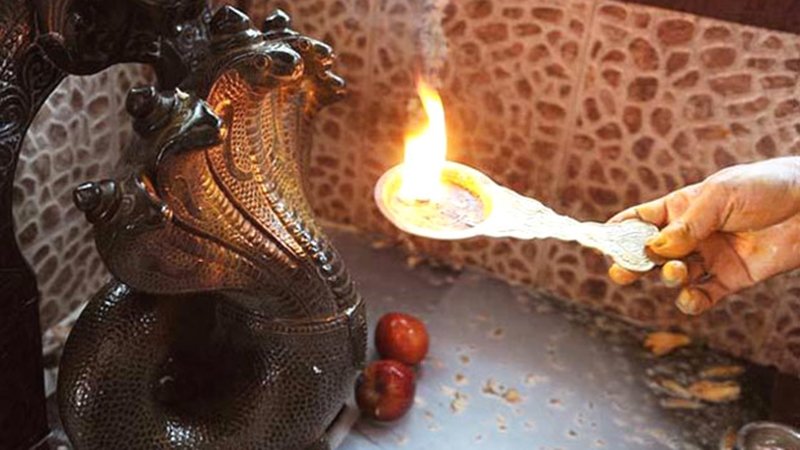Naga means snakes in particular and serpent clan in general. Panchami is the fifth day of the lunar cycle we have, first occurs during the ascending/Shukla phase and second during the descending/Krishna phase. The Panchami tithi that appears during the Shukla phase in the month of Shravana is celebrated as Naga Panchami.
Naga or the serpents have lived closely with human race. There is a reference of Arjuna in Mahabharata marrying the princess of Naga kingdom. Ulupi was the princess and they were blessed with a baby boy named Iravantha. Ulupi resurrects Arjuna when he was harmed by his own son Babruvahana from Chitrangada, Manipua princess. There is another mention of nagas in Mahabharata when Pareekshit, the grandson of Pandavas and son of Abhimanyu puts the dead snake in the neck of the sage Shamika. His son Shringi curses the king that he shall be bitten by a snake in seven days and gets killed. To avenge this killing, Janamejaya the son of Pareekshit performs the “Sarpa Yaga”. Another mention with reference to Garuda is snakes being his cousins, ask for Amruta to relieve Garuda and his mother out of slavery. Garuda gets it from Swarga and Indra takes it back before Nagas could savour it.
In different regions of our Bharat, the Nagas are worshiped either on Naga Panchami in the Shravana month or on Naga Chaturthi which comes in Kartika month. Nagas are revered and worshiped on these days, and sattvika food offering is given on this day. Predominantly these festivals are women led, and the intent often is to pray for the safety of their children. Part fasting that ends with acceptance of the uncooked Prasad offered to the deities is done.
To refrain people from unnecessarily harming the snakes, the mighty “Naga dosha” is ascribed to killing of snakes. “Kala Sarpa” is another form of viewing the influence of Nagas on human life. The broader thought behind the worship of Nagas is to celebrate the closer association due to the proximity of living spaces, and also an element of fear surrounding the snakes as a mysterious beings. When the fear of snake bite could kill people, instilling respectful and protecting image of the Naga deities is one sure way of co-existence and living in harmony.
Prof S Ainavolu is a Mumbai-based teacher of our Tradition and Management. Views are personal. https://www.linkedin.com/in/s-ainavolu-6831b724/



